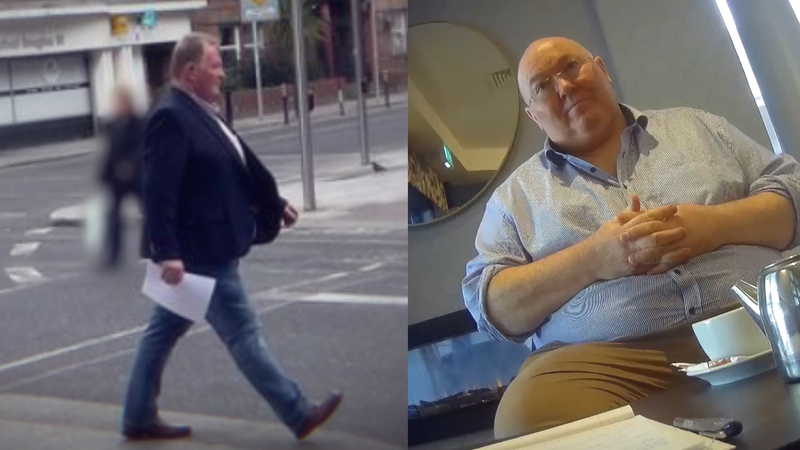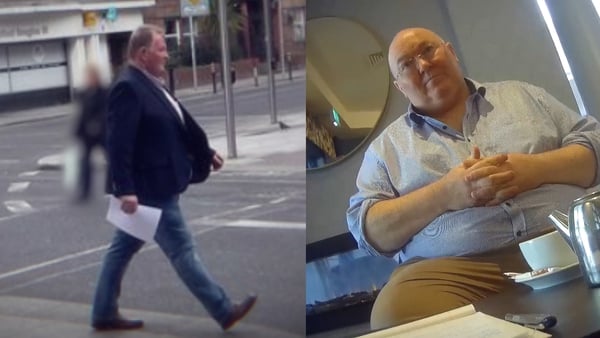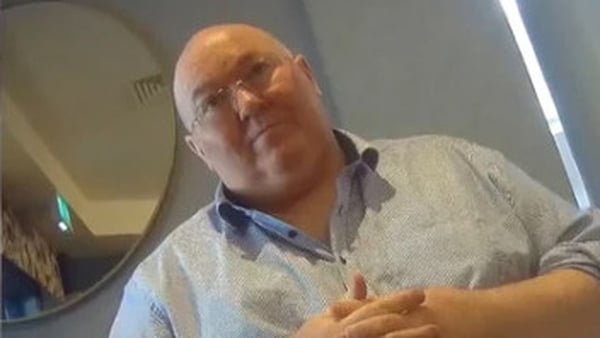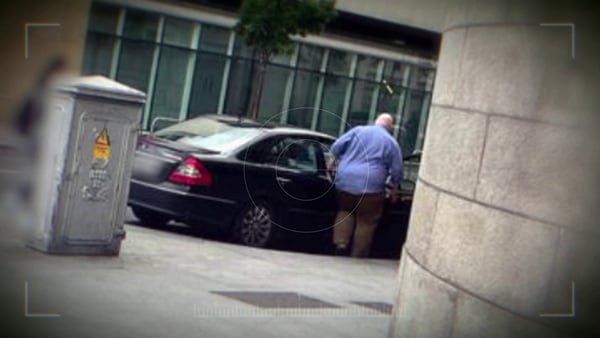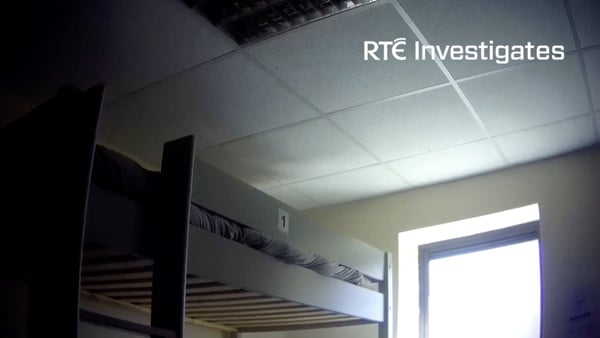Using covert recordings, RTÉ Investigates reveals how two individuals are making mischievous planning appeals against residential and industrial developments.
The appeals are withdrawn once payoffs are received from property developers.
In one instance, a payment of over €50,000 was made in return for the withdrawal of an appeal against a multi-million-euro commercial development.
In another, a property developer who would not provide a pay off ended up having his plans to develop 74 homes delayed for almost a year.
Over the course of six months, RTÉ Investigates tracked their activities.
At the stroke of a pen, environmental concerns can just evaporate according to self-styled environmental consultant John Callaghan.
His concerns about everything from climate targets to habitat directives just disappear — once he gets a payoff from the companies whose developments he's objecting to.
"The appeal dies. It just evaporates," he says.
Mr Callaghan and his brother Micheál, pictured above, submit objections at a variety of locations around the country and secure go-away payments — payoffs provided in return for objections being withdrawn.
So far this year, the payments have ranged from €10,000 to a sum in excess of €50,000.
It is a new twist in what we understand about payoffs in the planning system.
In this story, the environmental non-governmental organisation (NGO), normally the group we trust to protect the environment, are not actually the good guys.
However, this is not a normal NGO operation.
The Callaghan brothers operate self-styled environmental NGOs.
The activities of the Callaghans are exposed in secret recordings, company documents and witness statements which have been obtained during a six-month investigation for the programme, RTÉ Investigates: The Planning Trap.
RTÉ Investigates: The Planning Trap is broadcast tonight at 9.35pm on RTÉ 1 Television and on the RTÉ Player.
The Callaghan strategy is laid bare in our recordings as John Callaghan explains his remarkable system which persuades developers to give him a payoff.
Mr Callaghan admits, over a coffee meeting with a developer in a hotel lobby, that he makes one or two planning objections a week, typically at the first stage when applications are being considered by local councils.
"I put in a few token comments," he says in our footage. "No objective to kill off the planning application when it’s before a county council," he adds.
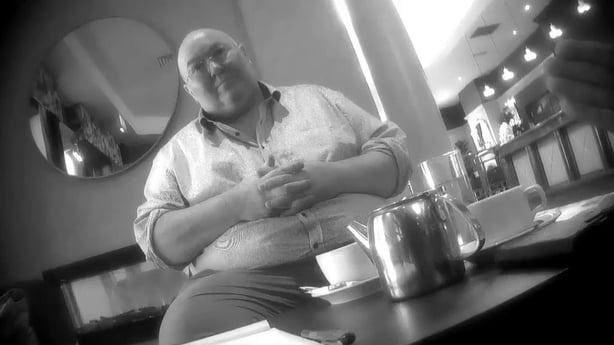
If the planning application succeeds this is a potential win for John Callaghan. This is because there are bigger gains if the case is granted planning permission but then appealed to An Bord Pleanála where there is a huge backlog of cases to be heard.
At that point the Callaghans have leverage as appeals can take up to a year before being decided and longer again if they go to the next stage — an appeal to the courts on a point of law by way of a judicial review.
John Callaghan noted his interest in judicial reviews during the covert recordings.
"I pick situations that I believe I can secure a win in or something's going to secure a win in a judicial review." he said.
The objections range from bland one-page "token" observations to seemingly credible appeals quoting EU law.
But what our recordings show is that these environmental concerns can be made to disappear by way of an agreement marked "strictly confidential" whereby the objector is hired as environmental consultant to the companies building the developments to which they are objecting against — in return for a very large fee.
Their only real function is to remove their planning objection.
This is achieved by way of a simple one-page form called a Section 140, which is submitted to withdraw an appeal from An Bord Pleanála.
In the recordings, Mr Callaghan is asked what happens to the environmental concerns once the Section 140 is submitted.
"They just die and there's no one to answer. It just evaporates," he says
When presented with our evidence, planners and environmentalists were horrified.
"Environmental concerns don't just evaporate. . . Whatever they might be, traffic, water impact, they don't evaporate just because you've withdrawn your appeal," Sorcha Turnbull of the Irish Planning Institute said.
WATCH: The Planning Trap - experts react to secret filming
We need your consent to load this comcast-player contentWe use comcast-player to manage extra content that can set cookies on your device and collect data about your activity. Please review their details and accept them to load the content.Manage Preferences
"What shocks me or annoys me about it, is that it then undermines trust in the system," Dr Paula Russell, Lecturer at University College Dublin's (UCD) School of School of Architecture, Planning and Environmental Policy said.
One of the developments to which the Callaghans were objecting to was a significant housing development.
It came as a surprise to the developers when they found out the addresses of the objectors — John Callaghan lives 250 kilometres away in Kells, Co Meath, while his brother Micheál lives 270 kilometres away in Mulranny, near Westport, Co Mayo.
Environmentalists and planning experts are concerned about the timing of disclosures about "go-away" payments while a new planning bill is still under consideration.
Dr Paula Russell believes the ability of all citizens to make planning appeals is a cherished featured of the Irish system because it is fundamentally democratic in nature.
"It means that other people who are genuinely making submissions about planning appeals are tarred with the same brush," Dr Russell said.
Sadhbh O’Neill, an environmental lecturer and activist, says she was "shocked" by what RTÉ Investigates uncovered.
"The planning system is already in some difficulty and is being brought further into disrepute by this kind of behaviour," Ms O’Neill added.
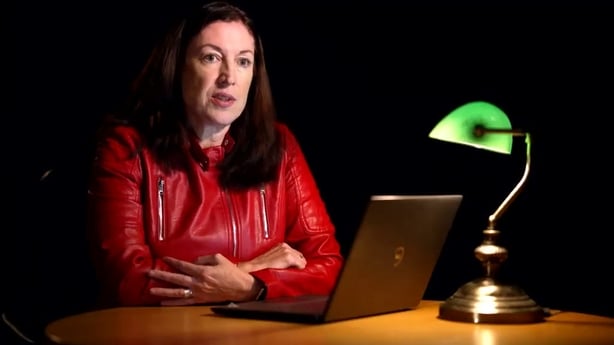
In each of the cases featured in the programme, John or Micheál Callaghan submitted a brief observation to a planning application and waited for a subsequent approach from a developer
In one of our cases developer Richard Hoare talks on camera about his journey through the planning system and his determination not to pay any money to John Callaghan.
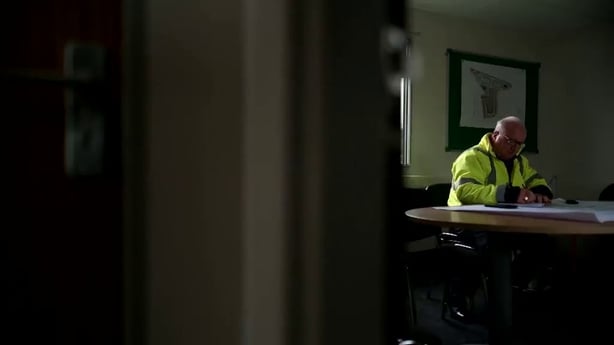
In this case, Mr Callaghan was operating alone under the banner of an NGO called Sustainability 2050. At an initial meeting with Mr Hoare, John Callaghan admitted that he typically submits token objections and waits for cases to play out in the planning appeals board.
This is a nightmare scenario for developers as appeals can take up to a year to be decided regardless of the merits of the appeal.
During a recorded meeting, Mr Callaghan said he was just there to a listen to a proposal and that he had no proposal to make to the developer.
The story took an unexpected turn however when Mr Hoare, without our knowledge, contacted John Callaghan and agreed a deal with him — and Mr Hoare then handed us the proof.
Mr Hoare supplied us with an audio recording and documents showing John Callaghan was paid €10,000. In return, Mr Callaghan did not submit an appeal against planning permission which had been granted to build 59 houses at Linenfield in Drogheda.
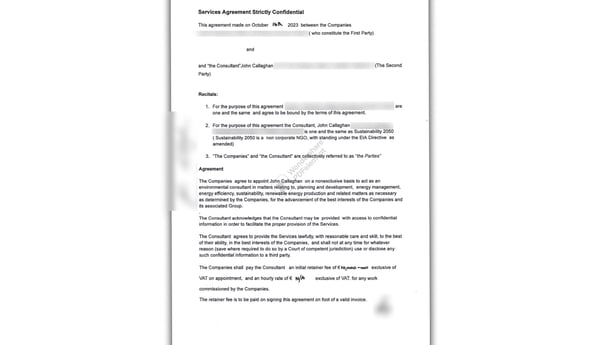
Having agreed the deal, John Callaghan also undertook not to make any observations about future developments by Mr Hoare.
The audio recordings show that Mr Callaghan proposed to characterise the arrangement with a contract, marked private and confidential, in which he becomes an "environmental consultant" to the developer Mr Hoare.
In reality, John Callaghan's consultancy agreement was simply a vehicle used to legitimise the payoff.
Mr Hoare, a former banker, from Foxrock, Co Dublin, described the consultancy agreement as "pure bullshit."
"It was all just a guise. . . He's packaging it as a consultancy agreement without there ever having been consultation, even about the idea of consultancy," Mr Hoare said.
John Callaghan had submitted an observation against Richard Hoare’s development when the case was being considered by Louth County Council.
Even though Mr Hoare was later granted planning permission, Mr Callaghan, who is not from the area, was entitled to make an appeal to An Bord Pleanála. This is because he had made a brief observation about the application.
"In order to avoid my planning permission going to appeal and to a black hole for twelve or 24 months and screwing up a project completely, I basically had to sign a service agreement with somebody for something I didn't want," Mr Hoare said.
Mr Hoare says he had to cut a deal with John Callaghan because he believed the observation made against his housing development was motivated by money rather than environmental concerns.
Mr Hoare went out of his way to expose John Callahan and volunteered his evidence to RTÉ Investigates.
However, the payment was contrary to the intent of the planning system.
When I asked if he was part of the problem by paying Mr Callaghan, Richard Hoare replied that, "If I had paid him and not said anything to anybody, in particular to you, well, then I would agree — I would have been part of the problem.
"Apart from my objective here being to expose him. I truly hope that this will facilitate getting my money back, for starters. But more importantly, I want to see this guy put out a business permanently. That's my objective."
Mr Callaghan operates a second self-styled NGO group with his brother Micheál. The group is called An Lucht Inbhuanaite or The Sustainable People. While operating under this banner, the pair were paid over €50,000 in return for withdrawing an appeal against a multi-million-euro commercial development this year.
RTÉ Investigates has established that the payment was routed through a company called Carbon Hunter Limited.
As part of the deal, a consultancy agreement was produced by John Callaghan. This proposed to make the Callaghan brothers "environmental consultants" to the development, which they had previously opposed.
After getting their payoff, the appeal was withdrawn the following day by Micheál Callaghan.
There was no further contact between John Callaghan and the development company — until Mr Callaghan received a right of reply letter from RTÉ Investigates.
Within hours of receiving our letter, we understand that John Callaghan made an unsolicited phone call to the developer and proceeded to offer him technical advice which the developer did not want or request.
RTÉ Investigates asked both John and Micheál Callaghan about payments they received from developers. We also put it to them that, based on our evidence, their planning appeals were not motivated by environmental concerns - but were instead intended to secure money in return for the withdrawal of their appeals.
In a response to our letters, John Callaghan provided a one-line statement, stating: "Please be aware that neither of the parties referred to in your letters has done anything unlawful."
The letter was signed by both John and Micheál Callaghan.
The developers who paid the Callaghans were able to proceed with their housing and commercial projects.
However, RTÉ Investigates also followed the journey of another developer, who has had to deal with John Callaghan - David Hogan from Co Cork.
Mr Hogan has not paid the Callaghans, but this comes at a high price — his planning permission for 74 houses in Watergrasshill, Co Cork is still held up by an appeal submitted by the Callaghans 11 months ago.
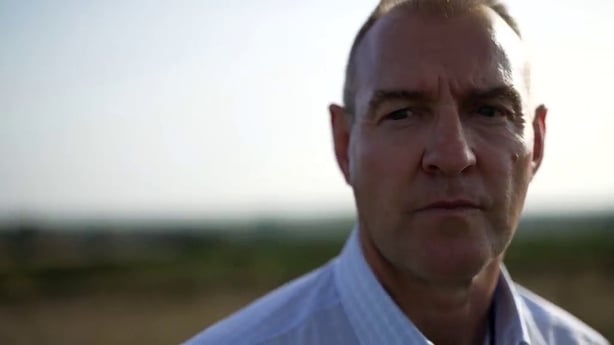
In that time, he has had plenty of interest in his development including from Katelyn Cotter and Aidan Keegan.
"We found the perfect place here. And I suppose we were hoping that it would be started already," Ms Cotter said.
"If I had not been impeded by the appeal situation, I could now be handing the keys of the new home to a couple like Aidan and Katelyn and off they go. But they're blocked, just like me," Mr Hogan said.
The attempts by the Callaghans to present themselves as representing NGOs has infuriated environmentalists.
"What makes me so angry is that I know all the organisations that I've worked with put so much time and effort and voluntary hours into building their organisations, establishing codes of governance and practise," Sahbh O'Neill environmentalist and lecturer said.
"The idea that individuals can parade themselves as an environmental organisation and use a planning system to extract financial gain for themselves, to me, is absolutely outrageous."
RTÉ Investigates: The Planning Trap is broadcast tonight at 9.35pm on RTÉ 1 Television and on the RTÉ Player.
